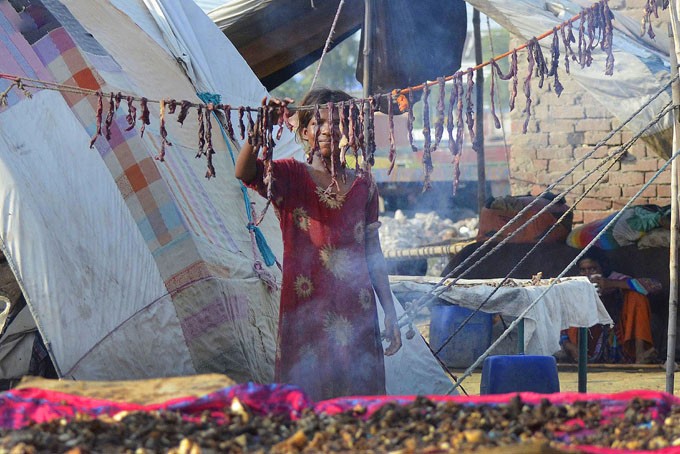
The gypsies have created ingenious ways to make up for the lack of facilities -- and preserving meat is one of these

The dilapidated and rusty gate creaked loudly as I pushed it open. A number of tents and patchy sheets were arranged in a semi-circle on the ground before me. As I walked in, I was warmly greeted and offered food and drinks and a chance to rest my feet. This was a much better welcome than I had ever received by people with houses built over several canals.
The land I entered was one sloppily built by vagabonds who were just passing through the area. These people, with no real area to call their own, followed a very simple (read basic) lifestyle, devoid of even the basic necessities like clean water, electricity, and gas. And the reason for my visit to these hospitable people was to see how, with Eid ul Azha having just gone by a few days ago, these people preserved the meat they acquired, and how they spent their life while settled in any particular place.
The first thing of mention is how not all of these people had meat that they could preserve. With immense financial struggles, it is impossible for them to buy animals for slaughter on eid, and any meat that they acquire is through people who offer it to them for charity, through their own efforts of going door to door, or through the people at whose houses they work as maids or drivers.
For this reason many of the people I spoke to seemed distraught at the fact that fortune did not favour them this time round. Though, this didn’t let them forgo their hospitality or optimism, and they still looked at the future with a sense of hope.
The first type of people I encountered were those who would work in houses as maids or in any other capacity within houses. These people would often receive a small portion of the meat that their employers had, and they would have their employers put the meat in their freezers as a means to preserve it.
The people had it easy, as they not only had an assured supply of meat, but also did not have to spend considerable time and effort in preserving the meat, something which the groups I will later talk about had to face. However, of the ten or so different communities I visited, there were only a couple like this, and most others had to look towards other means to both acquire, and preserve, the meat.
I visited more communities to see how they dealt with the situation where they had no access to a fridge or deep freezer. One of these lived on the barren land between Expo Centre and Emporium Mall; the people here had a unique way of preserving the meat -- they’d firstly dry it, which allows them to preserve the meat for up to 6 months. They also offered me a sample to taste, and what came as a surprise to me was how their method had resulted in much tastier meat than even the frozen or frosted meat would do.
The method they employed was simple: salt the meat lightly, and leave it in a large open area, under the sun, for almost a week. This results in the meat getting cooked in its own fat and turning dark brown, the perfect sign of well cooked meat. This way, the meat can be preserved for up to six months. Whenever they need to cook it, they just do so in a mixture of onions and tomatoes, and they are good to go.
Another method employed by a community based near Johar Town involved just using salt and a few other spices which would last them a week. While it could have lasted longer, in the words of one man there, "We get very little meat. Even though our method could help it last weeks, the small quantity means the meat finishes in just a week."
Yet another method employed by a community living near Township was to cook the meat in a mixture of salt and ghee, and dry it in the sun for about three days before storing it in a ceramic jar. This, however, must be used within five or so months.
All of these are highly effective and result in a great flavour of meat, besides being able to preserve for longer periods of time.
In the end, my trek through these downtrodden areas helped me see quite a few different aspects of our society, and the ways in which the underprivileged have to make do. These people have created ingenious ways to make up for the lack of facilities, and interviewing them made me realise that we all can learn a thing or two from them who we so casually -- and callously -- ignore.